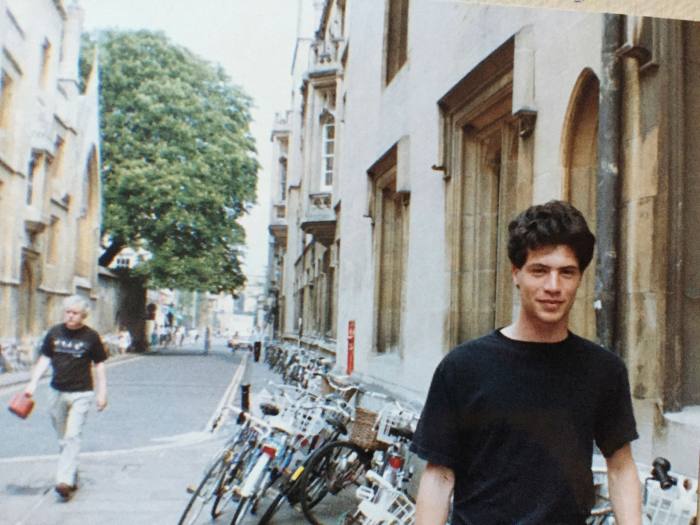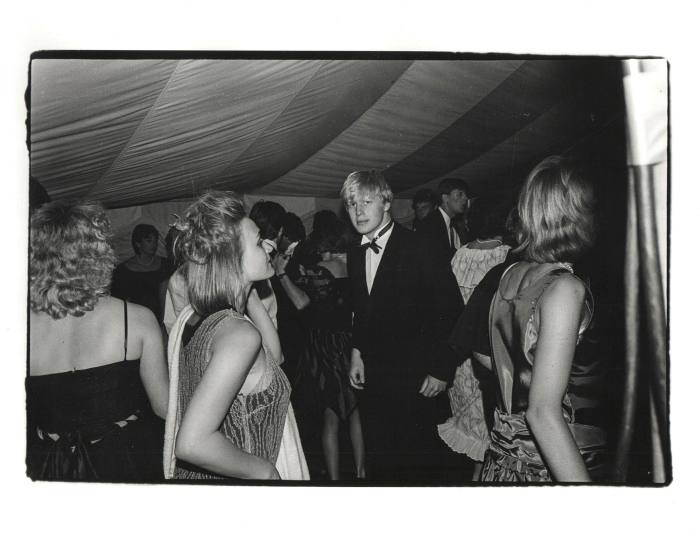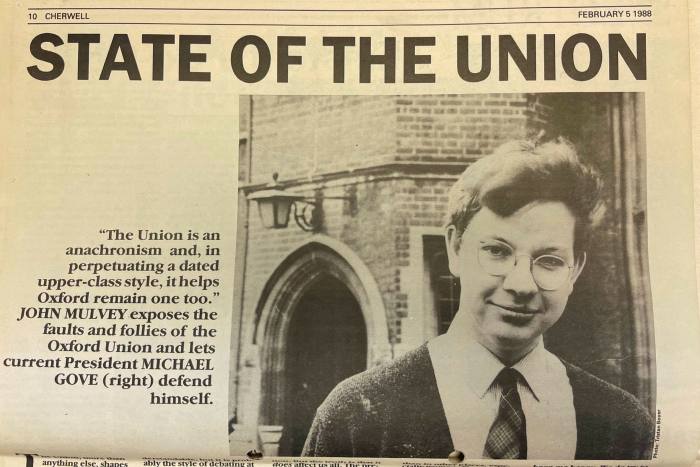A guide to A Day on the Green with Crowded House at Centennial Vineyards in Bowral
Half concert, half singalong, Crowded House filled the Bowl with love
Why 1980s Oxford holds the key to Britain’s ruling class
From Partygate to Brexit, many of today’s political dramas can be traced back to the leading players’ student days
Simon Kuper in 1989, during his days at Lincoln College
There’s a probably apocryphal saying that is attributed to Napoleon: “To understand the man, you have to know what was happening in the world when he was 20.” That’s how I try to understand the people now running the UK. Specifically, I imagine them as they were at the University of Oxford, preparing for power.
I see Boris Johnson as the tousle-headed president of the Oxford Union debating society, in 1986. Michael Gove, today Johnson’s right-hand man in cabinet, was the Union’s most incisive debater, despite his stock joke, “As I was telling my Filipino manservant this morning . . . ”
Their future political rivals, from David Cameron to Keir Starmer, were at Oxford then too, but it’s the Tory Brexiters who ended up remaking Britain. I arrived at Oxford in 1988, and my contemporaries included Jacob Rees-Mogg, now minister for Brexit opportunities; Dominic Cummings, who would oversee the campaign for Brexit and Johnson’s winning election campaign of 2019 before turning on him; and Daniel Hannan, who as a 19-year-old first-year Oxford history student born in Peru arguably came up with the genesis of Brexit.
I began examining the British government’s Oxford origins after the Brexit vote. Every country produces its own elites, but in today’s western world possibly only France, where the École Nationale d’Administration educated four of the last six presidents, has a ruling caste as small as the UK’s. (And France recently abolished the ENA and replaced it with the Institut National du Service Public.)
Jacob Rees-Mogg speaking at the Oxford Union in 1991, with Conservative politicians Kenneth Clarke and John Patten listening © Alamy I have come to think that Oxford in the 1980s holds the keys to understanding this Conservative generation: from their grand project, Brexit, through Johnson’s reluctance to lock down Britain during the pandemic, to their characteristic organisational mode of chumocracy, the life-long experiential chasm that separates them from Britons who cannot afford fuel and food, and the Partygate scandal — Johnson and his Oxford-educated chancellor Rishi Sunak were fined by police this week for breaking Covid-19 laws. Ruling Britain was the prerogative of their caste.
They didn’t want outsiders from Brussels muscling in Had you asked Oxford students in the mid-1980s to predict the prime minister of 2022, the most common answer would probably have been Boris Johnson. In the Oxford Union, as later in the Tory party, politicos instinctively clustered around the most charismatic extant Etonian.
Johnson’s Oxford votaries included Gove, the student journalist Toby Young, now voice of the Tory right, and Guto Harri, now Johnson’s director of communications, who fondly recalls his boss’s “utterly hilarious” readings of minutes nearly 40 years ago.
The student Johnson was an old-fashioned Tory by instinct rather than theory. Gove and Rees-Mogg at Oxford had more developed Thatcherite views. Awkwardly, though, their heroine was fulfilling their policy desires. By the time Margaret Thatcher was done, in 1990, there wasn’t much room left for more privatisation or tax-cutting if Britain was to remain a recognisable western country. Then her main foreign enemy, the Soviet Union, collapsed. The Oxford Tories were headed for power but without a project.
They felt they had been raised to inherit greatness. For anyone able to gloss over the brutality of empire, the achievements of their tiny caste were breathtaking. Between about 1860 and 1960, British men who had attended private school or Oxbridge or both had sat atop the modern world. They had governed a quarter of the planet, and overseen victory in two world wars.
They created modern sports, Keynesianism, Alice in Wonderland, Sherlock Holmes, Winnie the Pooh, The Jungle Book, Bertie Wooster, Nineteen Eighty-Four and James Bond. They had split the atom and discovered evolution, television and the structure of DNA. They helped invent the computer and the atomic bomb. After all that, for their descendants, modernity could only feel like decline. Johnson’s generation was growing up in a tame, post-imperial outpost of the European Economic Community. The American Republican pollster Frank Luntz, an Oxford debater of Johnson’s era, told me last year: “What America’s going through right now is what the UK was going through when I was there: ‘We’ve peaked.’”
But just after Johnson left Oxford, a new political project began brewing there. In September 1988, Thatcher gave her “Bruges speech”, warning against “a European superstate exercising a new dominance from Brussels”. She had belatedly realised that her beloved European single market would entail closer political integration. Her speech spooked the Oxford Tories. Ruling Britain was their caste’s prerogative.
They didn’t want outsiders in Brussels muscling in. Tory “Euroscepticism” began in part as a jobs protection scheme, like taxi drivers fighting Uber. One convert was Patrick Robertson, a history student at Oxford, a Scot raised in Paris and Rome. Robertson missed Thatcher’s Bruges speech, partly because he was busy writing his own antifederalist screed. Soon, though, he was shuttling to London to meet Eurosceptic power brokers. Thatcher admired Robertson; he observed that she smelt like his mother. He attended a dinner at the home of Christopher Monckton, a former member of her policy unit, where the idea of a referendum on Europe was discussed.
In early 1989 Robertson set up the Bruges Group think-tank, then left Oxford aged 20 to devote himself to it. At the time, wrote Eurosceptic member of parliament Bill Cash, the Bruges Group was “the only organised opposition” to the EEC. The Group rapidly attracted more than 100 backbench MPs. Later, Thatcher became its honorary president.
Today Robertson, who lives in Switzerland, runs the public relations firm WorldPR and is Kazakhstan’s honorary consul to the Bahamas. Johnson’s CV, accent, confidence and classical tags suggested he was more than just a funny man. In British terms, he was born to rule In November 1990, the Conservatives defenestrated Thatcher. Three weeks later her successor, John Major, approved the outlines of the federalist Maastricht treaty.
The 19-year-old Daniel Hannan was outraged. Britain, he thought, was giving away its sovereignty. In December 1990, Hannan and two student chums founded the Oxford Campaign for an Independent Britain. With hindsight, the CIB — which would intertwine with the Bruges Group — looks like the genesis of Brexit.
Owen Matthews, who became its social secretary because he liked organising cocktail parties, calls the group “the Ur-Brexit gang”. Hannan in 1990 was Marx in 1848: the thinker who sketched the paradise to come. Rees-Mogg, an early CIB member, told me: “I think he thought it [leaving the EU] through to its logical conclusion long before I did.” The CIB soon had hundreds of student members. Hannan often invited Eurosceptic MPs to speak at Oxford. After graduating in 1993, he headed to Westminster and helped them set up a parliamentary movement called the European Research Group. In 1998, 26-year-old Dominic Cummings became campaign director of Business for Sterling, a group that opposed Tony Blair’s plans to join the euro.
Hannan’s project had found its master communicator. When Cameron called the EU referendum on February 20 2016, Hannan’s moment had come. For Johnson, Brexit was the grand political cause he had always lacked. It would be a glorious romantic act, like the Charge of the Light Brigade, only with less personal risk. And it might help him become prime minister.
The Oxford Tories understood that Brexit might not work out brilliantly, but Britain had no natural predators and would survive even a blunder. Watching from Warsaw, Polish politician Radoslaw Sikorski, who had been a member with Johnson of Oxford’s upper-class Bullingdon dining club, remarked that for Poles, the EU wasn’t just a game. Oxford-educated leaders lent Brexit credibility. Johnson’s CV, accent, confidence and classical tags suggested that he was more than just a funny man. In British terms, he was born to rule. If he suggested that “the cost of getting out would be virtually nil”, then surely Brexit couldn’t be just a hazardous leap into the dark?
Brexit did eventually carry Johnson into Downing Street. But in early 2020 this government of Oxford PPE-ists, literature students, historians and lawyers, led by a classicist writing a biography of Shakespeare on the side, was hit by a problem for which Oxford had not prepared them: a virus. Suddenly they found themselves confronting questions of biology and statistics.
Once Johnson belatedly focused on Covid-19, he kept trying to avoid lockdowns. After all, his caste expected maximum personal freedom. Had he still been a columnist for The Daily Telegraph, he would surely have been warning the prime minister against imprisoning the nation over a flu.
Now that role was taken by other 1980s Oxford Tory journalists such as Toby Young, Julia Hartley-Brewer and James Delingpole. Their lack of scientific training did not dent their intellectual confidence. “When we have herd immunity, Boris will face a reckoning on this pointless and damaging lockdown,” wrote Young in July 2020.
He, Hartley-Brewer and Delingpole had inherited the role that Hannan, Gove and Johnson played over Brexit: a vanguard of wordsmiths can equip the Torysphere with an entertaining story, wrapped in Oxford-tutorial-level plausibility, larded with quips and selected statistics and appeals to ancient English traditions of liberty, Burke and all that.
A report by two parliamentary all-party committees would eventually call the government’s initial strategy of pursuing herd immunity and the consequent late first lockdown “one of the most important public health failures the United Kingdom has ever experienced”. Dido Harding didn’t pip other candidates to the post. There weren’t any other candidates. She was just handed the job The Good Law Project But in spring 2020, with death all around, Britain needed protective medical gear and Covid-19 tests. What to do? Cummings, running Downing Street for Johnson, despised Whitehall’s time-wasting procedures. It was time to move fast and break things.
Luckily, the people in government knew exactly the people who could help. In fact, they had known them since Oxford. Dido Harding was an Oxford chum of Cameron’s, and a bigshot in British horseracing. She had run the telecoms company TalkTalk (albeit not very successfully), but none of her business experience had been in healthcare. Nonetheless, the government put her in charge of the NHS’s Test and Trace programme. An NHS official explained that “Baroness Harding was hired for her leadership, not her knowledge”.
Leadership”, of course, is British code for being upper-class. The non-profit Good Law Project noted: “Dido Harding didn’t pip other candidates to the post at the interview. There weren’t any other candidates. She was just handed the job.”
Harding was allocated £37bn. But Meg Hillier, chair of the Commons public accounts committee, said in March 2021: “Despite the unimaginable resources thrown at this project, NHS Test and Trace cannot point to a measurable difference to the progress of the pandemic.”
This February, the High Court declared Harding’s appointment unlawful, as the appointments process had failed to comply with equality legislation. Admittedly, Test and Trace produced some winners: notably, the outsourcing company Serco, whose share price soared on government contracts. Serco’s chief executive Rupert Soames — a former Oxford Union president and Bullingdon member — earned £4.9mn in 2020.
The former Australian prime minister Malcolm Turnbull, who had been active in the Oxford Union as a Rhodes Scholar in the 1970s, told me in December 2020:
“The handling of Covid in the UK, I guess, is an example of not handling administration competently or effectively.
The once-over-lightly debating chamber style — well, you can skate along for quite a long time, but then you end up with very serious consequences.” One appointment succeeded brilliantly. Venture capitalist Kate Bingham had decades of experience in biotech. Possibly it was irrelevant that she had been at Oxford with Johnson, and later married the Conservative MP Jesse Norman (Eton and Oxford). Johnson made her head of the Vaccine Taskforce, and Britain rolled out vaccines before any other western country.
Recommended Philip Stephens Philip Stephens: Becoming ‘normal’ again is going to be hard for Britain Then, this winter, the Partygate scandal broke: while ordinary Britons were locked down, rule-makers had been illegally partying in Downing Street. To risk the premiership over office booze-ups might seem an insane act of self-harm — unless your caste expects maximum personal freedom.
Now the Oxford Tories are overseeing the steepest fall in living standards since records began 66 years ago, as costs of fuel and food skyrocket. Sunak and other Oxford Tories struggle to empathise — as do most of my caste of Oxbridge journalists, academics and comedians who narrate British events. Our lot know we won’t end up queueing at food banks. So much in today’s Britain follows from rule by an intimate elite that came together decades ago.
Simon Kuper’s ‘Chums: How a Tiny Caste of Oxford Tories Took Over the UK’ is published by Profile on April 28



